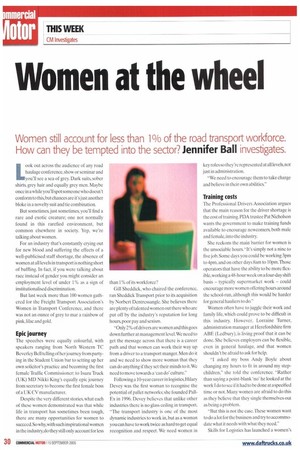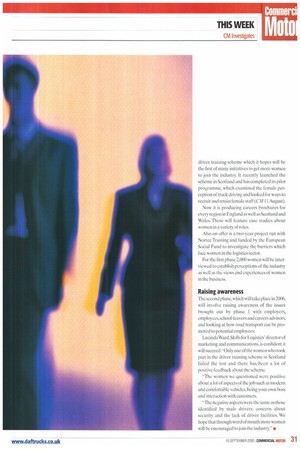Women at the wheel
Page 30

Page 31

If you've noticed an error in this article please click here to report it so we can fix it.
Women still account for less than 10/0 of the road transport workforce.
How can they be tempted into the sector? Jennifer Ball investigates.
Look out across the audience of any road haulage conference, show or seminar and you'll see a sea of grey. Dark suits, sober shirts, grey hair and equally grey men. Maybe once in a while you'll spot someone who doesn't conform to this,but chances are it's just another bloke in a novelty suit and tie combination.
But sometimes. just sometimes, you'll find a rare and exotic creature; one not normally found in this rarefied environment, but common elsewhere in society. Yep, we're talking about women.
For an industry that's constantly crying out for new blood and suffering the effects of a well-publicised staff shortage, the absence of women at all levels in transport is nothing short of baffling. In fact, if you were talking about race instead of gender you might consider an employment level of under 1% as a sign of institutionalised discrimination.
But last week more than 100 women gathered for the Freight Transport Association's Women in Transport Conference, and there was not an ounce of grey to mar a rainbow of pink, lilac and gold.
Epic journey
The speeches were equally colourful, with speakers ranging from North Western TC Beverley Bell telling of her journey from partying in the Student Union bar to setting up her own solicitor's practice and becoming the first female Traffic Commissioner; to Isiriu Truck (UK) MD Nikki King's equally epic journey from secretary to become the first female boss of a UK CV manufacturer.
Despite the very different stories, what each of these women demonstrated was that while life in transport has sometimes been tough, there are many opportunities for women to succeed. So why, with such inspirational women in the industry, do they still only account for less than 1% of its workforce?
Gill Sheddick, who chaired the conference, ran Sheddick Transport prior to its acquisition by Norbert Dentressangle. She believes there are plenty of talented women out there who are put off by the industry's reputation for long hours, poor pay and sexism.
"Only 2% of drivers are women and this goes down further at management level.We need to get the message across that there is a career path and that women can work their way up from a driver to a transport manger. Men do it and we need to show more woman that they can do anything if they set their minds to it. We need to move towards a 'can do' culture."
Following a 10-year career in logistics,Hilary Devey was the first woman to recognise the potential of pallet networks; she founded PallEx in 1996. Devey believes that unlike other industries there is no glass ceiling in transport. "The transport industry is one of the most dynamic industries to work in, but as a woman you can have to work twice as hard to get equal recognition and respect. We need women in key roles so they're represented at all levels, not just in administration.
"We need to encourage them to take charge and believe in their own abilities"
Training costs
The Professional Drivers Association argues that the main reason for the driver shortage is the cost of training. FDA trustee Pat Nicholson wants the government to make training funds available to encourage newcomers, both male and female, into the industry.
She reckons the main barrier for women is the unsociable hours. "It's simply not a nine to five job. Some days you could be working 3pm to 4pm, and on other days 8arn to lOpm.Those operators that have the ability to be more flexible, working a 48-hour week on a four-day shift basis — typically supermarket work — could encourage more women offering hours around the school-run, although this would be harder for general hauliers to do."
Women often have to juggle their work and family life, which could prove to be difficult in this industry. However, Lorraine Turner, administration manager at Herefordshire firm ABE (Ledbury), is living proof that it can be done. She believes employers can be flexible, even in general haulage, and that women shouldn't be afraid to ask for help.
asked my boss Andy Boyle about changing my hours to fit in around my stepchildren," she told the conference. "Rather than saying a point-blank 'no' he looked at the work I do to see if it had to be done at a specified time or not. Many women are afraid to do this as they believe that they single themselves out as being a problem.
"But this is not the case. These women want to do a lot for the business and try to accommodate what it needs with what they need."
Skills for Logistics has launched a women's driver training scheme which it hopes will be the first of many initiatives to get more women to join the industry. It recently launched the scheme in Scotland and has completed its pilot programme, which examined the female perception of truck driving and looked for ways to recruit and retain female staff (CM ii August).
Now it is producing careers brochures for every region in England as well as Scotland and Wales. These will feature case studies about women in a variety of roles.
Also on offer is a two-year project run with Nortec Training and funded by the European Social Fund to investigate the barriers which face women in the logistics sector.
For the first phase 2,000 women will be interviewed to establish perceptions of the industry as well as the views and experiences of women in the business.
Raising awareness
The second phase, which will take place in 2006, will involve raising awareness of the issues brought out by phase 1 with employers, employees,school-leavers and careers advisors, and looking at how road transport can be promoted to potential employees.
Lucinda Ward, Skills for Logistics' director of marketing and communications, is confident it will succeed."Only one of the women who took part in the driver training scheme in Scotland failed the test and there has been a lot of positive feedback about the scheme.
"The women we questioned were positive about a lot of aspects of the job such as modern and comfortable vehicles, being your own boss and interaction with customers, "The negative aspects were the same as those identified by male drivers: concern about security and the lack of driver facilities. We hope that through word of mouth more women will be encouraged to join the industry."






































































































































































































